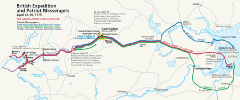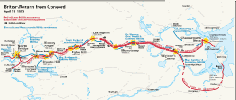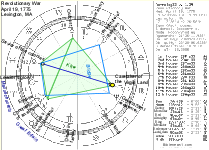Seeds of American Revolution
Battle of Lexington and Concord
Star Chart
Conclusion
Star Chart Planets
After the French and Indian War in which the colonial settlers of the Thirteen Original British Colonies fought with the British against France and Spain, the peace between the Americans and the British rapidly deteriorated. The British sought to tax the Americans to recover their war debt, and the Americans reacted with uncivil and arrogant disobedience characteristic of their wild frontier. The British Parliament passed laws to punish the Americans, and the Americans played the role of the rebellious son and restless renegade. British snobbery was only surpassed by American lawlessness.
When the British almost totally eliminated tax on tea from the East India Tea Company, the Americans should have rejoiced. Instead, some of them dressed as Indians and vandalized three of the company's ships in Boston harbor. On December 16, 1773, Day 350, they dumped 342 boxes of tea into the harbor in what was snidely referred to as the Boston Tea Party. The American vandals were not punished, and the incensed British set about to punish the entire colony. From divine viewpoint, this incident had a clear signature. Boston is at 42 N. latitude, where 42 represents Baal. There were 342 boxes of tea dumped. There were three ships, which symbolized Cosmic, Political, and Ecumenical Babylon. The ships symbolized a Satanic counterattack, and the American vandalism was lawlessness under the power of Baal. There was no justice. The American activism and rebellion was not just lawlessness and criminality, but the work of Satan, the original rebel.
The rift between the British and the American colonists
grew and festered. Disagreements and discontent became bitter and
hostilities increased with each side blaming the other. The Americans
formed their own Continental Congress and occupied the land, while the
British maintained garrisons a selected locations to protect regional governors
and enforce the edicts of the King. The Americans, who had maintained
their militia after the French and Indian War, began to stockpile guns
and ammunition. The seeds of rebellion had been sown.

When the British learned of American arms caches in Concord,
Massachusetts, the local Governor and British military commander in Boston,
General Thomas Gage, ordered a surgical strike to remove and destroy the
arms. On April 18, 1775, he gave sealed orders to Lieutenant Colonel
Francis Smith to take 700 British army regulars and not read the orders
until the troops were underway. The Americans in anticipation of
the British plan had already moved most of their arms from Concord.
By 10 PM Joseph Warren told William Dawes and Paul Revere of British troop
movement to Lexington and Concord. Dawes and Revere set out on horseback
to warn the American militias along the route that the British were coming.
Revere traveled a northern route to elude British sentries and Dawes traveled
a southern route out of Boston. Upon notification from Revere, Americans
in Charlestown sent additional riders north.
Revere and Dawes met with John Hancock and Samuel Adams
in Lexington. They correctly surmised that the British were not out
to capture them but to destroy the arms in Concord. Samuel Prescott
accompanied Dawes and Revere on the road to Concord, but Revere was captured
by a British patrol and Dawes was soon thrown from his horse. However,
Prescott escaped and warned the inhabitants of Concord and beyond.
However, the British reaction to the shot was immediate. Although the Americans were dispersing, the British began firing volleys and charged with bayonets. Some Americans returned fire, but most ran for their lives. Eight Americans were killed and 10 wounded, and one British soldier from the 10th Regiment was wounded. Although unknown at the time, this was the beginning of the American Revolutionary War.
A brief summary of the numbers is enlightening: The Battle of Lexington began at Sunrise on April 19, for the federal judiciary. The number, 1775, depending upon parsing means: 17, lawlessness; 77, Reverse Process Reversionism; 75, Sovereignty. It was Day 109, for the Plagues of Egypt, or the destruction of Egypt, a symbol of the destruction of the world, or world war. There were 77 militiamen. Eight Americans were killed, where 8 is for the New Birth. This was the beginning of the birth of Client Nation USA and the fall of Client Nation, Great Britain. Ten Americans were wounded and one British soldier from the 10th Regiment was wounded, where 10 is for the Laws of Establishment (laws of the land).
 The
British proceeded to Concord, where they were observed by the Concord militia
of about 250 men under the command of Colonel James Barrett. The
Americans let the British have Concord and took up position on a hill above
the town north of North Bridge. The British divided their forces
to search for the hidden arms caches. Militia from surrounding communities
soon swelled the American ranks to 400 men.
The
British proceeded to Concord, where they were observed by the Concord militia
of about 250 men under the command of Colonel James Barrett. The
Americans let the British have Concord and took up position on a hill above
the town north of North Bridge. The British divided their forces
to search for the hidden arms caches. Militia from surrounding communities
soon swelled the American ranks to 400 men.
Upon seeing smoke rising from Concord, Barrett ordered his men to North Bridge, which was being held by about 100 British infantry. The American militia advanced down the highway toward the bridge because the Concord River was flooded and overflowed along both sides of the road. The British retreated back across the bridge. In the confusion of a disorganized retreat, a shot was fired from the British side. Although it was likely only a warning shot, other British soldiers began to fire before they could be commanded to stop. Two Americans were killed and four wounded. Then the order to fire was given to the Americans. The Americans opened fire on the British separated by the Concord River about 50 yards away. Four British leaders were wounded along with 9 privates, and 3 privates were killed or mortally wounded. The British panicked and ran. Barrett divided his men into two groups and took up defensive positions in anticipation of a counterattack. However, the British chose not to attack.
After noon, the British began their march back to Boston. By now the American ranks had swelled to about 1,000 men. At Meriam's Corner, a narrow bridge about a mile from Concord afforded the Americans an opportunity to attack. In a brief skirmish, two British were killed and about 6 wounded. Another mile down the road American militia waited in the woods at Brooks Hill. The British attacked but were driven back after taking significant casualties. As the British continued their march, the Americans would hide, shoot into their ranks, and run. Captain John Parker's Lexington militia regrouped and ambushed the British with vengeance on hills between Concord and Lexington. The British retreat was halted, and then the troops began to run in disarray. The commander, Colonel Smith was wounded in the thigh, and the horse of his next in command, Major Pitcairn, was shot out from under him.
The British considered surrendering, but reinforcements of 1,000 men arrived with artillery. They regrouped and treated their wounded at Lexington and then continued their march. Brigadier General William Heath arrived and took command of the American militia, who continued to attack the British from behind walls, trees, and from houses along the way. The most intense fighting occurred in Menotomy and Cambridge where 25 Americans were killed and 9 wounded, and 40 British were killed and 80 wounded. The British successfully avoided a major ambush outside of Charlestown and returned to the safety of their defenses.
The casualty report at the end of the day was: Americans - 49 killed, 5 missing, 39 wounded; British - 73 killed, 53 missing, 174 wounded. The American militia laid siege to Boston. The 11-month Siege of Boston was the beginning of the Revolutionary War. The American militia became the Continental Army, and George Washington became its commander.
 The
Star Chart for the Battle of Lexington, which began at Sunrise on April
19, 1775, contains a nearly perfectly formed Kite and a Bridge. The
Kite symbolizes the grace blessings of the Cross. The Lord was about
to replace Great Britain as the Client Nation with the United States of
America. A Kite symbolizes the ability to soar like a bird above
the circumstances of life while others are stuck on the ground under the
circumstances. People with a Kite have more stability, greater flexibility,
more happiness and productivity, This characterized the flexibility,
adaptability, and alacrity of the American militia attacking the British
along the road in the Battle of Concord and Lexington. The Bridge
Configuration corresponds to North Bridge outside Concord where the battle
began.
The
Star Chart for the Battle of Lexington, which began at Sunrise on April
19, 1775, contains a nearly perfectly formed Kite and a Bridge. The
Kite symbolizes the grace blessings of the Cross. The Lord was about
to replace Great Britain as the Client Nation with the United States of
America. A Kite symbolizes the ability to soar like a bird above
the circumstances of life while others are stuck on the ground under the
circumstances. People with a Kite have more stability, greater flexibility,
more happiness and productivity, This characterized the flexibility,
adaptability, and alacrity of the American militia attacking the British
along the road in the Battle of Concord and Lexington. The Bridge
Configuration corresponds to North Bridge outside Concord where the battle
began.
The Ascendant Sign was Pisces, which contained the Savior Planet. The Savior Planet in Pisces symbolized the Savior of the Colonies and the rising Priest Nation (Client Nation). The Sun Sign was Aries, the Ram. The Sun in Aries symbolizes a leader's glory. The leadership of the company commanders of the continental militia was superior to British leadership in the Battle of Concord and Lexington. For most of the day the American militia was without a general officer.
The Moon Sign was Scorpius, the Scorpion. The Moon in Scorpius symbolizes the Prostitute of Babylon, or Synagogue of Satan. This is a clue that something was wrong. It was also near the Full Moon, which adds even more significance. Was the Prostitute the British or the Americans? The answer is both. However, Great Britain generally symbolized the Evil King and the American colonies the Prostitute of Babylon. Wars are the remedy of last resort after the Church fails. The Church fails due to the Prostitute of Babylon. The Church in England had failed, and the Church in America had failed. Even with good evangelism in both countries, the Church lacked the Spiritual Maturity to overcome the power of Baal and Jezebel.
Midheaven was Sagittarius, the Archer and symbol of a raiding band. In the Battle of Lexington and Concord, the British raiding band was raided by the American militia.
Kite
The Kite characterized the Battle of Lexington and Concord as success of the American militia due to greater flexibility, adaptability, and operational stability. The American militia struck from hills, behind trees, from houses, and across bridges and straits (narrows in the road). The focus of the Kite was the God of the Covenants Planet in Virgo, which symbolizes a caretaker of the virgin land. The Battle was over the new land, not about taxes or support for the old country of Great Britain.
The God of the Covenants Planet was in opposition to the Savior Planet in Pisces, which symbolized the savior of the colonies. Of course, from the British perspective this symbolized the British troops as the savior of the colonies for Great Britain.
On one corner of the Kite was the Mediator Planet in Taurus, the symbol of success through a mediator. The mediator represented the horsemen who alerted the colonists. William Dawes and Paul Revere rode to Lexington where they were joined by Samuel Prescott. Other horsemen went north. The horsemen were the heralds of the war just as the Four Horsemen of the Apocalypse were the heralds of the Armageddon War. Even though the British were only after arms caches, the sign of the horsemen heralds was the sign of war per New Testament doctrine.
On the other corner of the Kite was the Last Adam in Capricornus, the sign of an outcast. In the destruction of a national entity through the Fifth Cycle of Discipline, the losers are cast out.
Taurus
Taurus corresponds to Great Britain on the Zodiac Map. Three planets in Taurus add power to the significance of the sign, which corresponds to prosperity in the Millennium. The Almighty God Planet and Morning Star were in conjunction. The Almighty God Planet was right on the cusp of Aries. In Taurus it signifies an empire, and the Morning Star in Taurus symbolizes the conqueror of an empire. The colonists would have to defeat the powerful empire of Great Britain. The Mediator Planet in Taurus symbolizes success through a mediator, which has already been discussed. It also symbolizes the mediator of the new Client Nation, which would be the United States of America. The Continental militia in fighting the British had become the mediator of the new nation.
Leo
There were two planets in Leo, the Lion and symbol of a ruler. The Red Planet in Leo symbolized a bloody king or tyrant. The British army with red coats symbolized bloodshed and suffering for a king who was a tyrant, and the Continental militia was spilling its blood for the new government that was being born.
The Redeemer Planet in Leo symbolized the government as the redeemer of the people. Here again both the British army and Continental militia were fighting to redeem the people they represented.
The war began because the Church failed. When Christians fail to advance to maturity, Satan takes over and eventually inspires power struggles and rebellion. The American militia who attacked the British in the Battle of Lexington and Concord were activists and rebels. They were rebelling against God's duly constituted authority in the evil King George and the corrupt British Parliament. David faced a similar problem with King Saul, but he didn't kill the king. Christians in America and Great Britain failed to use their freedom and advance to maturity. Consequently, Satan took over. He wanted to destroy the British Client Nation, and he wanted to destroy the American colonies because he knew they were about to become the next Client Nation. The people of America and Great Britain were easily deceived by Satan to do his bidding.
Lest there be any confusion, this does not call for pacifism. Both activism and pacifism are evil. The Church and state are separate. The Church is a spiritual body, and the state is temporal. The Church has a responsibility to God, and the state has a responsibility as God's arm of authority and the protector of the people. When the Church fails, the state is left at the mercy of Satan. Satan wants to rule the world as he tried at the Tower of Babel. And he will use war or any other means to gain that end.
There were 13 Original Colonies along the eastern seaboard. The number, 13, stands for the double blessing of Israel. It was the sign of a Client Nation because it corresponded to the Tribes of Israel that camped around the Tabernacle. That was the Client Nation Model.4 When the number of colonies reached 13, the differences between Great Britain and the colonists began to mount. The Plan of God did not call for Great Britain to rule America. Thus, increasing conflict was inevitable. However, that was still no excuse for the split that occurred when the British fell into the moral decadence of legalism and the Americans fell into the immoral degeneracy of lawlessness.
![]()
![]()
Released February 5, 2010 - Revised March 6, 2015
| Beginning | Author | Comments | Home |